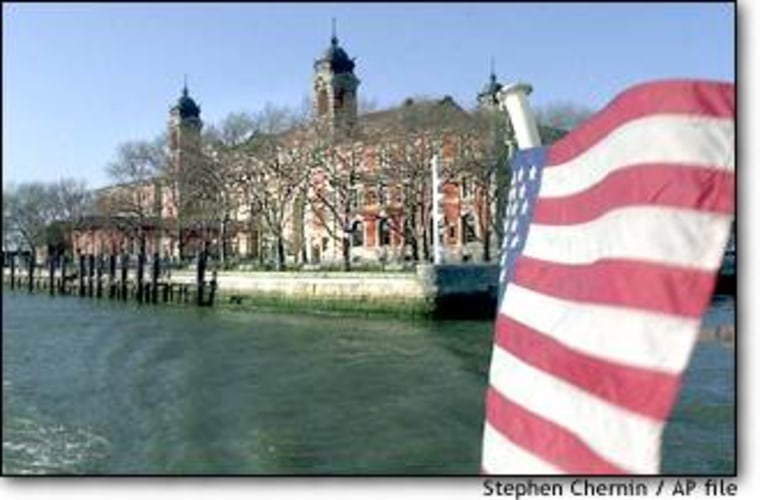The photographs of America’s earliest immigrants adorn the walls of this island museum, telling the story of a gnawing hunger for a better life. The immigration terminal on this island in New York harbor closed down decades ago, but hundreds of thousands of people still flock to America for much the same reason: the notion that hard work will pay off.
Most of today's huddled masses come not from southern and Eastern Europe as they did in Ellis Island’s heyday, but from Latin America, Asia the Caribbean and Africa. The U.S. is in the middle of an immigration wave that rivals the one that began the 20th century. In 2000, 10.4 percent of the U.S. population was foreign-born, up from 4.7 percent in 1970. Some 26 million people have come to the United States since 1970, nearly a third of all the immigrants in the nation’s history, according to the Census Bureau.
Their reasons for coming have remain constant — to escape social, religious and political repression, poverty and bleak futures. To new immigrants like Donika Vuksni, 45, who came to New York from Albania three years ago with her husband and three children, America was the Promised Land.
“The government in Albania is no good,” she says in her newly acquired English. “The people there are very angry because they have no work.” Donika herself has not yet found a job, but her husband has found work as a car mechanic. Both her daughters have graduated from college and have married native-born Americans, and her son will graduate from high school soon. She cites these events as proof of her lifelong belief that “the United States is perfect and beautiful.”
Educational opportunities beckon
The educational opportunities offered by life in America inspired Nubia Cuellar, 41, to leave her native Cali, Colombia, and come to the United States illegally 14 years ago.
“I had to better my life,” she says. In a country where it would have taken her two years just to get an appointment to apply for a visa, Cuellar and her brother decided they had no choice but to take the illegal route. They took a flight to Tijuana, Mexico, made their way to the border and walked across to San Diego. She went on to New York and learned to speak English, and eventually became a Spanish teacher. Cuellar got her green card in 1995 and became a citizen earlier this year. “It was a dream that I never thought would come true,” she says, shaking her head. “I had the opportunity to go to college and become a professional. There’s no way I could have done that in Colombia.”
The United States holds the same appeal for highly educated professionals like Satish Kochar, 49. The Indian-born I.T. consultant says it was always his dream to end up in the United States, even after having lived and worked everywhere from Kabul to Copenhagen.
He applied for his green card in December 2000 and expects it to come through within the next few months, despite the uncertainties after Sept. 11. “The U.S. has the best educational opportunities for my children,” he says. “I have no doubt that any hardworking person can make it here.”
More scrutiny for newcomers
The aftermath of Sept. 11 has not yet led to a massive anti-immigration atmosphere, as feared by many immigrant-rights advocates like Muzaffar Chishti, a lawyer and senior analyst at the Migration Policy Institute. Muslims, too, continue to arrive in large numbers. But the federal Immigration and Naturalization Service has begun to scrutinize all newcomers, especially those from the Middle East and South Asia.
“Changes in immigration policy will be framed by national security,” Chishti says. “We’re going to see more stringent security measures, including biometrics and finger-printing.”
Margie McHugh, executive director of the New York Immigration Coalition, says that the number of people already in the country who wanted to legalize their status or become citizens increased sharply in the months following the attacks — by 50 percent to 65 percent, according to some estimates.
This poses a serious problem for applicants who have dived into the process instead of waiting until their English language skills were better.
“It’s extremely difficult for immigrants to find affordable English classes that they need to get through the citizenship test,” McHugh says.
Safety in citizenship
“There’s been a feeling that it’s not safe to be in the country and not be a citizen,” McHugh says.
It’s a sentiment that pushed Miguel, 26, who asked that his last name not be used, to legalize his status 10 years after he came to America. He flew to New York from Puebla, Mexico, and stayed illegally, like thousands of his compatriots working on the lower rungs of the restaurant industry.
His main reason for taking on the perils of the legalization process is his daughter, 2-year-old Jasmine. “It’s better schools, better economy, just more opportunities,” says Miguel as the toddler closes a fist around his fingers.
Says Muzaffar Chishti, “It’s the promise of economic opportunities not just for ourselves, but for our children. America has kept that promise again and again. It’s the most enduring part of the American dream.”
